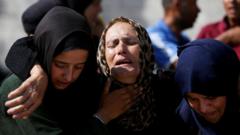In a significant development amidst ongoing conflict, the International Atomic Energy Agency (IAEA) announced on Friday that its inspectors had departed from Iran. This evacuation follows Iran's recent decision to suspend cooperation with the IAEA, which is tasked with overseeing nuclear activities and ensuring compliance with international agreements. The situation escalated following Israel's military strikes against Iranian sites, which many fear could push Iran to advance its nuclear ambitions underground.
**Tensions Rise as Iran Halts Cooperation with Nuclear Inspectors Amid Conflict Fallout**

**Tensions Rise as Iran Halts Cooperation with Nuclear Inspectors Amid Conflict Fallout**
International inspectors exit Iran, raising alarms over potential nuclear escalation following increased military strikes.
Iran’s President enacted legislation on Wednesday, effectively ceasing the nation’s collaboration with the IAEA. This law has raised concerns about diminished oversight on Iran's nuclear program at a time when experts speculate that military actions may prompt Iran to enhance its weapons capability out of international view. The abrupt halt fosters unease as military actions from Israel, and subsequent U.S. involvement have exacerbated a tense regional landscape.
As tensions peaked following the Israeli attacks on Iranian infrastructure — which were launched soon after the IAEA remarked on Iran's nuclear noncompliance — Iranian officials expressed grievances over perceived international bias favoring Israel. The Iranian government contends that the IAEA’s censure provided justification for Israel’s preemptive strikes, which reportedly targeted critical military and nuclear facilities.
While the extent of damage to Iran's nuclear developments remains unclear, U.S. officials, including former President Trump, have proclaimed significant setbacks to Iranian capabilities. Conversely, IAEA Director General Rafael Grossi has warned that Iran’s reserves of highly enriched uranium continue to grow, placing the country within striking distance of developing nuclear weapons if the situation is not managed.
Grossi outlined the pressing need for a dialogue to restore monitoring and verification operations in Iran. However, Iranian lawmakers have made the resumption of cooperation contingent on two conditions — ensuring the safety of their nuclear program and an acknowledgment of their entitlement to uranium enrichment under international norms. Despite the tensions, Iranian officials, including Deputy Foreign Minister Majid Takht-Ravanchi, have signaled openness to renewed negotiations with Washington, emphasizing a preference for diplomacy over escalation.
As the international community remains vigilant, the implications of Iran's suspended cooperation with the IAEA may reverberate globally, potentially reshaping nuclear dynamics and geopolitical relations in the Middle East region.
As tensions peaked following the Israeli attacks on Iranian infrastructure — which were launched soon after the IAEA remarked on Iran's nuclear noncompliance — Iranian officials expressed grievances over perceived international bias favoring Israel. The Iranian government contends that the IAEA’s censure provided justification for Israel’s preemptive strikes, which reportedly targeted critical military and nuclear facilities.
While the extent of damage to Iran's nuclear developments remains unclear, U.S. officials, including former President Trump, have proclaimed significant setbacks to Iranian capabilities. Conversely, IAEA Director General Rafael Grossi has warned that Iran’s reserves of highly enriched uranium continue to grow, placing the country within striking distance of developing nuclear weapons if the situation is not managed.
Grossi outlined the pressing need for a dialogue to restore monitoring and verification operations in Iran. However, Iranian lawmakers have made the resumption of cooperation contingent on two conditions — ensuring the safety of their nuclear program and an acknowledgment of their entitlement to uranium enrichment under international norms. Despite the tensions, Iranian officials, including Deputy Foreign Minister Majid Takht-Ravanchi, have signaled openness to renewed negotiations with Washington, emphasizing a preference for diplomacy over escalation.
As the international community remains vigilant, the implications of Iran's suspended cooperation with the IAEA may reverberate globally, potentially reshaping nuclear dynamics and geopolitical relations in the Middle East region.






















